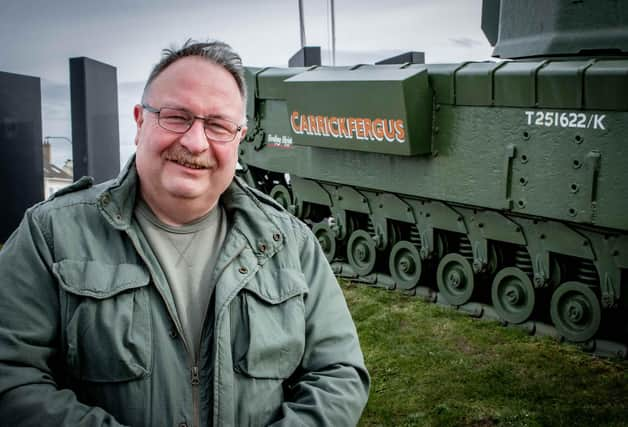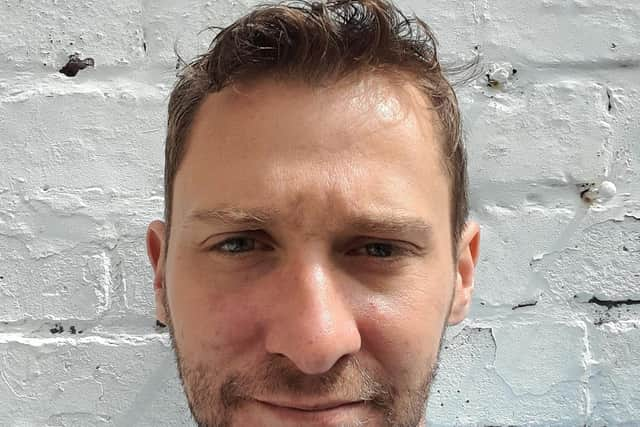Stroke Association calls for greater psychological and emotional support in Northern Ireland


Adrian Hack, from Carrickfergus, had a TIA, also known as a ‘mini stroke’ in June 2014 whilst sitting at home watching the football World Cup on TV.
Adrian, 59, recalls: “The first thing I was aware of was that my gaze had involuntarily moved up to the ceiling and I couldn’t seem to bring my eyes down to the level of the TV screen again.
Advertisement
Hide AdAdvertisement
Hide Ad"I heard my wife Eileen say that the right-hand side of my face had drooped and when I went to lift my right hand to feel my face, I couldn’t move it.


"Similarly, when I went to stand up to check my face in the mirror, I realised that my right leg wouldn’t move either. It was round about then I noticed that whilst I was thinking clearly enough, my speech was slurred and unrecognisable to me. Eileen, my wife recognised what was happening, as the FAST symptoms and phoned for an ambulance which took me to Antrim Area Hospital.”
Adrian is now eight years on from his stroke but he still has lasting effects.
“I have recovered physically from my TIA, but I still find myself weeping at happy and sad events. I don't pretend to have been a tough old character before, but the benchmark of when the tears start has dropped significantly since my TIA - so much, that I try to avoid watching certain films or TV programmes.
Advertisement
Hide AdAdvertisement
Hide Ad"My self-confidence has taken a blow, and strangely I find myself constantly doubting any positive feedback I get on anything I'm involved in. I often think such praise is offered as a form of sympathy, even when I know that it 100% is genuine. I find receiving praise makes me feel like an imposter, full of self-doubt.”
Adrian did not receive any emotional support post stroke.
He said: “I was never offered emotional support and may not have taken it but I definitely needed it. Looking back, I can see that I needed it. I would look on My Stroke Guide and online forums for advice at how to deal with my emotions and take solace that many felt as I did.
“Personally I felt like I shouldn’t be a burden and just had to get on with it. But if support was given it would have helped me tremendously.
"You don’t always want to talk to the people close to you. We get a physiotherapist to help with paralysis, a speech and language therapist for aphasia but nothing for mental health.
Advertisement
Hide AdAdvertisement
Hide Ad“Family and friends can be nervous what to say to you. They don’t want to say the wrong thing so don’t really say anything. Conversations were awkward and sterile to begin with. Having someone to talk to directly about my stroke and how I felt may have encouraged me to talk more about how lonely I felt in the first few months post stroke.”
The Stroke Association is calling for the Department of Health to prioritise psychological and emotional support services for stroke survivors in Northern Ireland after a recent report shows that many are living without professional support.
Stroke happens in the brain, is very sudden and as such can be traumatic for survivors.
The largest ever survey of stroke survivors and their families found that 93 per cent of stroke survivors in Northern Ireland experience mental health issues following their stroke, including a lack of confidence, anxiety, depression, mood swings and suicidal thoughts.
Advertisement
Hide AdAdvertisement
Hide AdNational guidelines for stroke care recommend that psychological care should be provided for stroke survivors both in the hospital and at home in the community. Despite this, a recent Association of Clinical Psychologists (ACPUK) paper revealed that only 30-50 per cent of stroke survivors and their families in Northern Ireland who need clinical psychological support are actually receiving it.
While the Stroke Association’s Struggling to Recover report shows that a shocking 90 per cent of stroke survivors in NI feel that their emotional needs are not met once they leave hospital.
Alasdair O’Hara, associate director for the Stroke Association in Northern Ireland said: “The Northern Ireland stroke workforce is one of the best and hardest working in the world; they’re saving lives every day and giving people the best chance of the best recovery. But we can see that there’s a big gap when it comes to the psychological and emotional support stroke survivors need to rebuild their lives.
"The Department of Health need to help close this gap by prioritising psychological and emotional support when implementing the new Stroke Action Plan.
Advertisement
Hide AdAdvertisement
Hide Ad"This means we need to see some long-term funding attached to the Stroke Action Plan to help alleviate the structural and chronic labour shortages across the stroke pathway, including in the number of psychologists working in stroke.
“Stroke Association’s new STEPs service, a stroke-specific emotional counselling service for stroke survivors and carers across Northern Ireland provides free, one-to-one professional counselling sessions in a safe and confidential space for stroke survivors and carers to talk about the things affecting them.”
Dominick Gallagher, emotional support manager for the Stroke Association in Northern Ireland added: “Stroke survivors who have used our STEPS service say that it helped them feel less alone, to understand what was happening in their brain and gave them hope for the future.
“The service is currently funded for three years but we'd love to see it become a vital part of the stroke recovery pathway in NI so that everyone who needs support can access it.”
Advertisement
Hide AdAdvertisement
Hide AdProfessor Siobhan O'Neill, Mental Health Champion NI: said:
“Stroke is a traumatic and lifechanging event, with a huge psychological impact and a high risk of mental illness. To improve outcomes for survivors, stroke rehabilitation services need to be co-designed with those affected by strokes, and incorporate emotional support, counselling and peer support.”
Dr Gerrard Sloan, consultant, Southern Health & Social Care Trust:
“In order to offer the best service for those who are living with stroke we must address all avenues of care as a multidisciplinary team.
"This very much includes psychological support for the individual and indeed those who support or love that person.